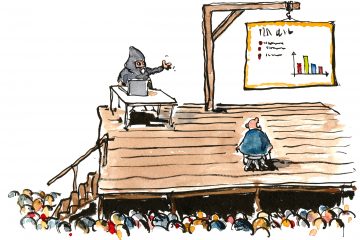
Star Wars and Brexit: The “Rebel Alliance” leaves its mark
It is a period of civil war. Rebel politicians, striking from hidden Westminster offices, have won their first victory against the evil Brexiteer Prime Minister. During the battle, Rebel MPs manage to steal control of the Commons… The so-called “rebel alliance” of pro-EU MPs secured an important victory on September 4 of this year in their quest to prevent a no-deal Brexit: parliament passed the Benn-Burt Bill, which requires Prime Minister Boris Johnson to seek a four-month extension of Article 50 if parliament has not agreed to a no-deal Brexit or a withdrawal agreement by October 19. When the result of the vote was announced, protestors outside of the House of Commons, celebrated by playing the Star Wars theme tune. …

‘You did not act in time’: Greta Thunberg and behavioural contestation
‘Basically nothing is being done to halt — or even slow — climate and ecological breakdown, despite all the beautiful words and promises’. Greta Thunberg’s damning speech before the UK parliament last month highlights that the greatest challenge to international climate agreements is inaction by governments. The Swedish climate activist’s central message was: ‘You did not act in time’. The norms within the Paris Agreement on climate change are challenged not just by climate change deniers and other open critics. Perhaps more dangerously, as Thunberg pointed out, they are also contested by states like the UK that pay lip-service to the agreement but fail to reach their emissions reduction targets. To capture these diverse forms of norm contestation, a collection of articles on ‘The dynamics of dissent’ in …

Bizarre, strange or last straw? Slideshows in International Relations
Last week, Israeli Prime Minister Benjamin Netanyahu made headlines with his PowerPoint presentation on Iran’s nuclear program. Media outlets talked of a ‘bizarre PowerPoint’, a ‘strange slideshow’ and deemed it unnecessary for Netanyahu ‘to convince us that you don’t support the Iran nuclear deal’. The slideshow quickly became a twitter meme. What these reactions made me recall is how rare it is for heads of state or government officials to use PowerPoint slides, or any type of visualizations, to convey and illustrate information of international concern to the public. While PowerPoint is a medium of debatable value, nonetheless, we all use it frequently to present complex information. It is the default medium in business and academia, but it is not …

Even more unpredictable: Trump’s U-turn on Syria
“When you kill innocent children – innocent babies – babies – little babies with a chemical gas that is so lethal, people were shocked to hear what gas it was, that crosses many, many lines. Beyond a red line, many, many lines,” Trump said when asked about Tuesday’s chemical weapons attack in Syria that killed some 80 civilians and injured many more. Thursday night he swiftly followed through with his remarks, launching missile strikes on Shayrat airfield in Syria, where the attack is suspected to have originated. Commentators have been quick to point out Trump’s remarkable U-turn on Syria. From his ‘America First’ rhetoric, to his cosying up to Putin and repeated statements that he thinks ‘many very bad things …

TRUMP’S IMPACT ON INTERNATIONAL RELATIONS
It is slowly dawning on us all that Donald Trump was right when he said that the American election day ‘will be Brexit times 10’. In my experience, 4,000 miles across the Atlantic, people looked ten times more shocked when they saw Trump give a victory speech than when it became clear that their country had decided to leave the European Union. Much has been written about Trump’s hateful rhetoric, which has offended 282 people and places on twitter alone, and the possible ramifications of his breaking long-established domestic norms. But it is the global implications of a Trump presidency that worries people across the globe. If he makes true on his campaign promises, we would see a large-scale withdrawal …










